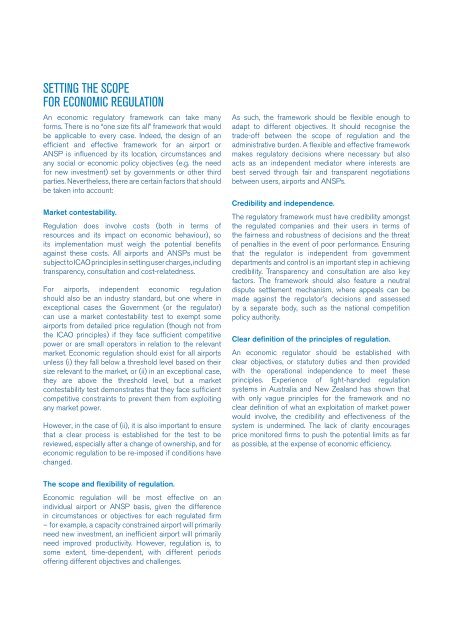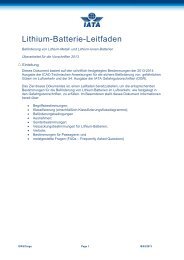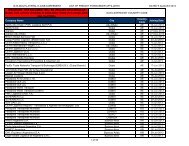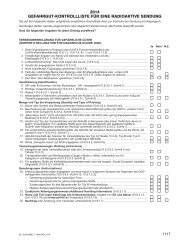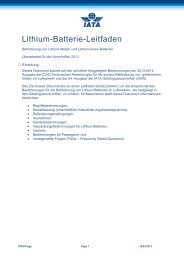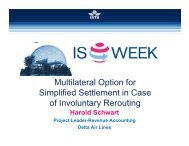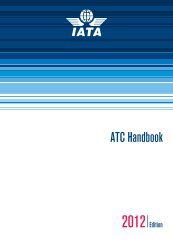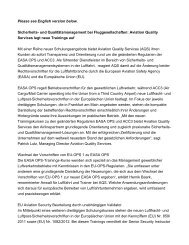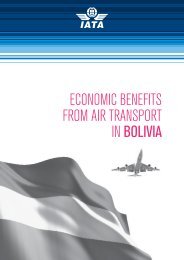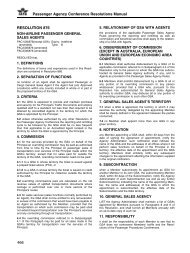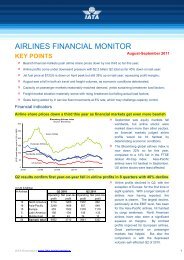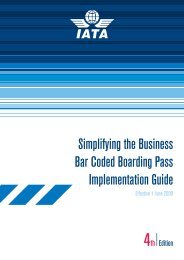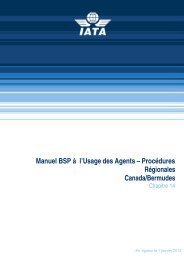Economic Regulation - IATA
Economic Regulation - IATA
Economic Regulation - IATA
You also want an ePaper? Increase the reach of your titles
YUMPU automatically turns print PDFs into web optimized ePapers that Google loves.
Setting the scope<br />
for <strong>Economic</strong> <strong>Regulation</strong><br />
An economic regulatory framework can take many<br />
forms. There is no “one size fits all” framework that would<br />
be applicable to every case. Indeed, the design of an<br />
efficient and effective framework for an airport or<br />
ANSP is influenced by its location, circumstances and<br />
any social or economic policy objectives (e.g. the need<br />
for new investment) set by governments or other third<br />
parties. Nevertheless, there are certain factors that should<br />
be taken into account:<br />
Market contestability.<br />
<strong>Regulation</strong> does involve costs (both in terms of<br />
resources and its impact on economic behaviour), so<br />
its implementation must weigh the potential benefits<br />
against these costs. All airports and ANSPs must be<br />
subject to ICAO principles in setting user charges, including<br />
transparency, consultation and cost-relatedness.<br />
For airports, independent economic regulation<br />
should also be an industry standard, but one where in<br />
exceptional cases the Government (or the regulator)<br />
can use a market contestability test to exempt some<br />
airports from detailed price regulation (though not from<br />
the ICAO principles) if they face sufficient competitive<br />
power or are small operators in relation to the relevant<br />
market. <strong>Economic</strong> regulation should exist for all airports<br />
unless (i) they fall below a threshold level based on their<br />
size relevant to the market, or (ii) in an exceptional case,<br />
they are above the threshold level, but a market<br />
contestability test demonstrates that they face sufficient<br />
competitive constraints to prevent them from exploiting<br />
any market power.<br />
However, in the case of (ii), it is also important to ensure<br />
that a clear process is established for the test to be<br />
reviewed, especially after a change of ownership, and for<br />
economic regulation to be re-imposed if conditions have<br />
changed.<br />
As such, the framework should be flexible enough to<br />
adapt to different objectives. It should recognise the<br />
trade-off between the scope of regulation and the<br />
administrative burden. A flexible and effective framework<br />
makes regulatory decisions where necessary but also<br />
acts as an independent mediator where interests are<br />
best served through fair and transparent negotiations<br />
between users, airports and ANSPs.<br />
Credibility and independence.<br />
The regulatory framework must have credibility amongst<br />
the regulated companies and their users in terms of<br />
the fairness and robustness of decisions and the threat<br />
of penalties in the event of poor performance. Ensuring<br />
that the regulator is independent from government<br />
departments and control is an important step in achieving<br />
credibility. Transparency and consultation are also key<br />
factors. The framework should also feature a neutral<br />
dispute settlement mechanism, where appeals can be<br />
made against the regulator’s decisions and assessed<br />
by a separate body, such as the national competition<br />
policy authority.<br />
Clear definition of the principles of regulation.<br />
An economic regulator should be established with<br />
clear objectives, or statutory duties and then provided<br />
with the operational independence to meet these<br />
principles. Experience of light-handed regulation<br />
systems in Australia and New Zealand has shown that<br />
with only vague principles for the framework and no<br />
clear definition of what an exploitation of market power<br />
would involve, the credibility and effectiveness of the<br />
system is undermined. The lack of clarity encourages<br />
price monitored firms to push the potential limits as far<br />
as possible, at the expense of economic efficiency.<br />
The scope and flexibility of regulation.<br />
<strong>Economic</strong> regulation will be most effective on an<br />
individual airport or ANSP basis, given the difference<br />
in circumstances or objectives for each regulated firm<br />
– for example, a capacity constrained airport will primarily<br />
need new investment, an inefficient airport will primarily<br />
need improved productivity. However, regulation is, to<br />
some extent, time-dependent, with different periods<br />
offering different objectives and challenges.


